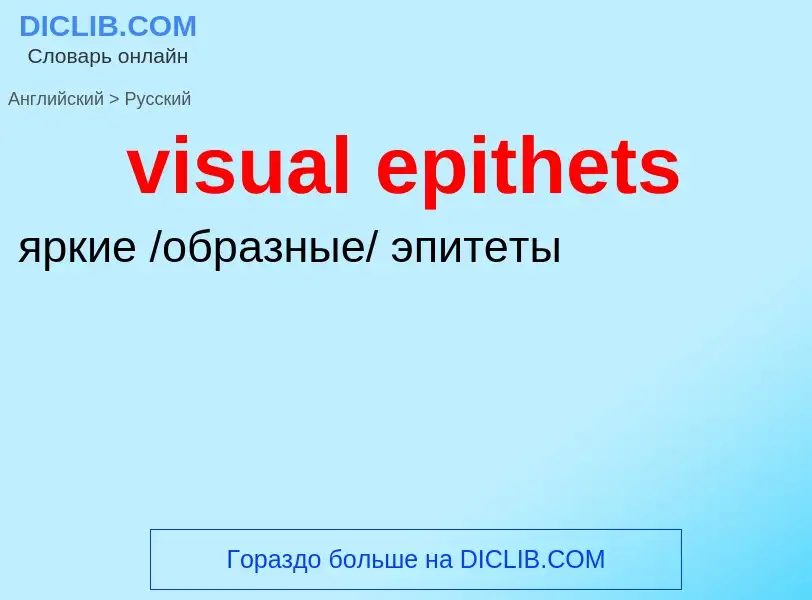Traducción y análisis de palabras por inteligencia artificial ChatGPT
En esta página puede obtener un análisis detallado de una palabra o frase, producido utilizando la mejor tecnología de inteligencia artificial hasta la fecha:
- cómo se usa la palabra
- frecuencia de uso
- se utiliza con más frecuencia en el habla oral o escrita
- opciones de traducción
- ejemplos de uso (varias frases con traducción)
- etimología
visual epithets - traducción al ruso
['blaindli]
наречие
общая лексика
безрассудно
машинально
слепо, безрассудно
как слепой
Definición
Wikipedia
A characteristic of Homer's style is the use of epithets, as in "rosy-fingered" Dawn or "swift-footed" Achilles. Epithets are used because of the constraints of the dactylic hexameter (i.e., it is convenient to have a stockpile of metrically fitting phrases to add to a name) and because of the oral transmission of the poems; they are mnemonic aids to the singer and the audience alike.
Formulae in epic poetry from various Indo-European traditions may be traced to a common tradition. For example, the phrase for "everlasting glory" or "undying fame" can be found in the Homeric Greek as κλέος ἄφθιτον / kléos áphthiton and Vedic Sanskrit as श्रवो अक्षितम् / śrávo ákṣitam. These two phrases were, in terms of historical linguistics, equivalent in phonology, accentuation, and quantity (syllable length). In other words, they descend from a fragment of poetic diction (reconstructable as Proto-Indo-European *ḱléwos ń̥dʰgʷʰitom) which was handed down in parallel over many centuries, in continually diverging forms, by generations of singers whose ultimate ancestors shared an archetypal repertoire of poetic formulae and narrative themes.
In contrast to the more general term 'epithet' (ἐπίθετον), which is used in poetic contexts, for the ancient Greek religion, the epiclesis (epíklēsis (ἐπίκλησις; literally 'calling upon')) was used as the surname that was associated with a deity during religious invocations.
Epithets alter the meaning of each noun to which they are attached. They specify the existential nature of a noun; that is to say, Achilles is not called "swift-footed" only when he runs; it is a marker of a quality that does not change. Special epithets, such as patronymics, are used exclusively for particular subjects and distinguish them from others, while generic epithets are used of many subjects and speak less to their individual characters. In these examples, the epithet can be contradictory to the past state of the subject: in Odyssey VI.74, for instance, Nausicaa takes her "radiant clothing", ἐσθῆτα φαεινήν, to be washed; since it is dirty, it is unlikely to be radiant.


!['''Visual pathway lesions''' <br>
From top to bottom: <br> 1. Complete loss of vision in the right eye <br> 2. Bitemporal hemianopia <br> 3. Homonymous hemianopia <br> 4. Quadrantanopia <br> 5.& 6. Quadrantanopia with [[macular sparing]] '''Visual pathway lesions''' <br>
From top to bottom: <br> 1. Complete loss of vision in the right eye <br> 2. Bitemporal hemianopia <br> 3. Homonymous hemianopia <br> 4. Quadrantanopia <br> 5.& 6. Quadrantanopia with [[macular sparing]]](https://commons.wikimedia.org/wiki/Special:FilePath/Hemianopsia en.jpg?width=200)


![Paris as seen with [[bitemporal hemianopsia]] Paris as seen with [[bitemporal hemianopsia]]](https://commons.wikimedia.org/wiki/Special:FilePath/bitempvf.png?width=200)
![Paris as seen with [[binasal hemianopsia]] Paris as seen with [[binasal hemianopsia]]](https://commons.wikimedia.org/wiki/Special:FilePath/binasalvf.png?width=200)
![Paris as seen with left [[homonymous hemianopsia]] Paris as seen with left [[homonymous hemianopsia]]](https://commons.wikimedia.org/wiki/Special:FilePath/Paris as seen with left homonymous hemianopsia.png?width=200)
![Paris as seen with right [[homonymous hemianopsia]] Paris as seen with right [[homonymous hemianopsia]]](https://commons.wikimedia.org/wiki/Special:FilePath/rhvf.png?width=200)


![The burden of [[onchocerciasis]]: children leading blind adults in Africa The burden of [[onchocerciasis]]: children leading blind adults in Africa](https://commons.wikimedia.org/wiki/Special:FilePath/68-4062-1 (ATED).jpg?width=200)
![Mana village, Uttarakhand]] Mana village, Uttarakhand]]](https://commons.wikimedia.org/wiki/Special:FilePath/Blind girl feels shape of vehicle near Mana village, Uttarakhand.jpg?width=200)
![A blind man is assisted by a [[guide dog]] in Brasília, Brazil. A blind man is assisted by a [[guide dog]] in Brasília, Brazil.](https://commons.wikimedia.org/wiki/Special:FilePath/Caoguia2006.jpg?width=200)
![''The Sense of Touch'' by [[Jusepe de Ribera]] depicts a blind man holding a marble head in his hands. ''The Sense of Touch'' by [[Jusepe de Ribera]] depicts a blind man holding a marble head in his hands.](https://commons.wikimedia.org/wiki/Special:FilePath/José de Ribera 018.jpg?width=200)


.jpg?width=200)
![[[Tommy Edison]], a blind film critic, demonstrates for his viewers how a blind person can cook alone. [[Tommy Edison]], a blind film critic, demonstrates for his viewers how a blind person can cook alone.](https://commons.wikimedia.org/wiki/Special:FilePath/Tommy Edison blind cooking.jpg?width=200)
![''Blind Woman'' by [[Diego Velázquez]] ''Blind Woman'' by [[Diego Velázquez]]](https://commons.wikimedia.org/wiki/Special:FilePath/Velázquez Blind woman.jpg?width=200)

![[[Braille watch]] [[Braille watch]]](https://commons.wikimedia.org/wiki/Special:FilePath/Watch for the blind2.jpg?width=200)
